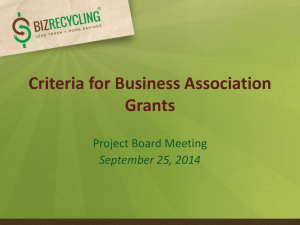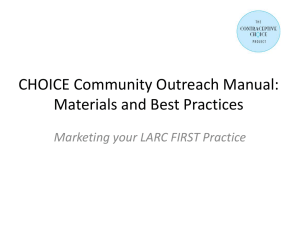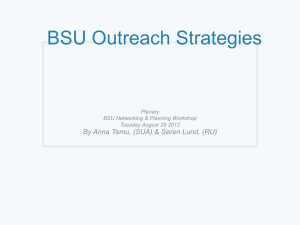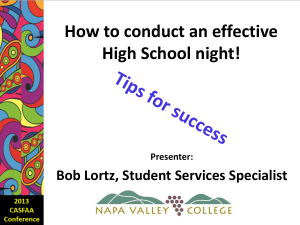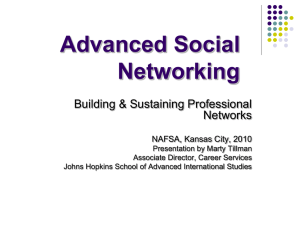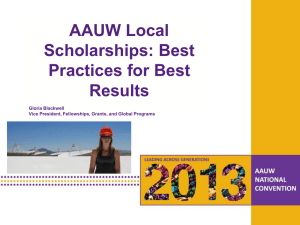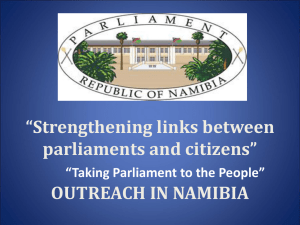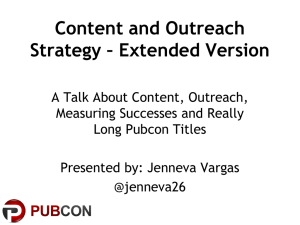Community Outreach Strategies 101
advertisement
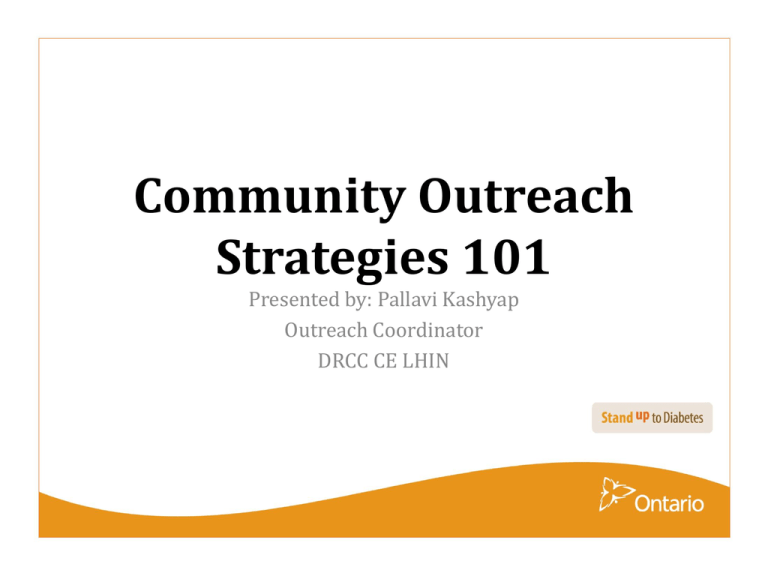
Community Outreach Strategies 101 Presented by: Pallavi Kashyap Outreach Coordinator DRCC CE LHIN Key Learning • Broader understanding and definition of Outreach • Scope and Advantages of Outreach • Toolkit for Effective Outreach What is Outreach? Outreach in simple words is: “ To start where the client is, outside the office –in the community ” Outreach is an intervention or activity conducted by community health workers, health educators, health promoters out in the community, face-to-face with individuals, agency staff, leaders, educators, politicians and the community What is Outreach? Outreach is defined as a two-way communication between your agency and the stakeholders to establish and foster mutual understanding, promote participation and involvement and influence behaviours, attitudes and actions. Outreach is reaching out to people who are not using any of the services provided by your agency and informing and educating them about your services. What is Inreach? Inreach is: Approaching the people who are using the services provided by your organization, but who are not using your education and management services. Inreach is fostering relationships with these individuals and educating them about your programs and services and urging them to participate and access your program. Why should we do Outreach? • Outreach efforts result in developing a liaison between the agency and the community • Improves community awareness, trust and accurate understanding of your mission, program and successes • Increases collaboration and communication with community members, stakeholders and key partners • Share resources and exchange ideas • Increase program attendance • Most importantly, when conducted consistently, outreach can stimulate behavioral change and the implementation of risk/harm reduction modalities among the targeted groups. Principles of Outreach • Clearly identify the people you are trying to reach • One size does not fit all -- Tailor your outreach strategy, message and your materials according to your target audience • Think from the clients/ communities perspective and include information about your services that may be helpful to hear/read • Enlist key community leaders to be your ambassadors • Outreach = Material + Personal Contact in multiple ways and multiple times, build trust and become a familiar face • Be a conversationalist and not a preacher • Create a system and schedule for providing outreach • Take your outreach to social media/social network • Consider where you have done outreach and think about who is missing, track who is coming and adjust your strategy as needed? Outreach Goals • • • • • Enhance Community Awareness Increase the visibility of program Broaden community support Engage new partners/ stakeholders Improve knowledge and attitudes and health behaviours Outreach Lifecycle 1. Planning Needs Assessment Goals and Objectives Stakeholder Identification Key messages 2. Development Structure for Implementation Outreach strategy tools and Mechanism 3. Execution Implementation Adjustments 4. Evaluation Process and Outcome evaluation Result analysis 10 Steps Of Outreach Planning • Conduct Needs Assessment – Cultural Assessment, Community Resource inventory and Community Asset Mapping • Know your issue • Create a list of Stakeholders Development • Conceive a Game Plan after you have the results of your needs assessment • Build a Coalition and start engaging with key decision-makers • Develop Outreach Materials • Select your potential Stakeholders 10 Steps Of Outreach Execution • Bring Everyone Together • Implement outreach plan Evaluation • Evaluate, both the process as well as the outcome • Share Best Practices, help others learn from your experiences. Outreach Tools & Mechanisms Key tools for engaging communities and increasing awareness of your project • Community Outreach kits according to the audience • Community forums/ workshops--designed for specific target groups • Presentations to various businesses, agencies, partners • Stakeholder Partnership Development–Collaboration based Approach to planning • Communications Plan– Oral and Written messages • Displays at locations where the community gather • Website Case Study Split into 2 groups for the following exercise: Plan and develop an outreach and an inreach plan for a DEP in a CHC which is located in a rural setting and has been operational for two years. The population is 15,000, comprised mainly of older adults. The community does not have public transportation. This DEP is functioning at a 52% capacity and is having difficulties recruiting clients. • Identify the objectives of your outreach and inreach plan • Identify your stakeholders • Identify the strategies, tools and mechanisms for this outreach plan
